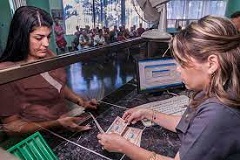Sustainability criteria in Cuban banking: Barriers and challenges
Keywords:
banking, sustainability, sustainable banking, green banking, sustainability criteriaAbstract
Cuban banking needs to consider the economic and social guidelines and the country's 2030-development plan in its strategic projection. Likewise, it must recognize the Sustainable Development Goals, the Paris Climate Agreement and the United Nations Principles for Responsible Banking. In this way, it proves to be a responsible actor, who supports a sustainable future with its actions and can obtain long-term commercial benefits. To achieve this purpose, it must incorporate sustainability criteria and indicators that allow it to know the results that are achieved and the extent to which its products and services reach international standards. This paper aims to describe the perceptions of Cuban specialists regarding sustainable banking and the sustainability criteria and indicators applicable in this context, as well as to explain the current situation of sustainable banking in Latin America. It uses the exploratory-descriptive method supported by the documentary review and the application of a questionnaire. The results identify the existing barriers to adopting the sustainability criteria, propose actions to advance in the desired direction and analyze the current situation in Argentina and Chile. The recommendations are aimed at creating conditions that contribute to inclusive, sustainable and rights-friendly economic growth for future generations.
References
ALIDE (2020) Bancos de desarrollo deben apuntar al desarrollo sostenible y resiliente ante el COVID-19 Comunicado de Prensa, Asociación Latinoamericana de Instituciones Financieras para el Desarrollo, Octubre 15, 2020 https://www.iadb.org/es/noticias/bancos-de-desarrollo-deben-apuntar-al-desarrollo-sostenible-y-resiliente-ante-el-covid-19
Barneda, C. y Rojas, E. (2006) El Desarrollo Sostenible en el Sector Financiero Argentino. Buenos Aires: UNEP FI, 2006.
BCRA (2016) Información sobre entidades financieras. www.bcra.gov.ar/PublicacionesEstadisticas/Entidades_financieras.asp. Consultado 25.11.2016
Borrás, F. (2017) La función social de los bancos cubanos, Revista Cubana de Administración Pública y Empresarial, Vol. 1, No 1, La Habana, p. 31-39.
PNUMA - CAF (2016), El Desarrollo Sostenible en el Sistema Bancario de Argentina. Grupo Regional de América Latina y el Caribe de la Iniciativa Financiera de ONU Medio Ambiente (LATF - UNEP FI) y CAF-Banco de Desarrollo de América Latina https://www.unepfi.org/wordpress/wp-content/uploads/2017/05/EL-DESARROLLO-SOSTENIBLE-EN-EL-SISTEMA-BANCARIO-DE-ARGENTINA-D9.pdf
Ramos, E. y Borrás, F. (2017) Las relaciones crediticias entre las empresas y la banca comercial en Cuba, Cofin Habana, Vol. 11, No 2, La Habana, p. 397-410.
Rojas, E. y Adimark, G. (2016) El Desarrollo Sostenible en el Sistema Bancario de Chile. Santiago de Chile: UNEP FI – CAF.
Sánchez, M. (2019) Cuba y los Bancos Multilaterales de Desarrollo (BMD): explorando oportunidades, Revista Cubana de Economía Internacional, Vol. 6 No 179 http://biblioteca.clacso.edu.ar/Cuba/ciei-uh/20190410013342/RCEI_No1_2019.pdf
SBN (2019) Global Progress Report of the Sustainable Banking Network Innovations in Policy and Industry Actions in Emerging Markets, Executive Summary, October 2019 https://www.ifc.org/wps/wcm/connect/topics_ext_content/ifc_external_corporate_site/sustainability-at-ifc/company-resources/sustainable-finance/SBN_2019%20GlobalProgressReport
UNEP-FI (2019) Principios de banca responsable. Guía de implementación https://www.unepfi.org/wordpress/wp-content/uploads/2020/03/PRB-Guidance-Document-Spanish-D3.pdf
Valls, M. C. (2019) Banca ética en Europa. Comparativa con la banca tradicional https://www.researchgate.net/publication/334560813_Banca_etica_en_Europa_Comparativa_con_la_banca_tradicional

Downloads
Published
How to Cite
Issue
Section
License

This work is licensed under a Creative Commons Attribution-NonCommercial-NoDerivatives 4.0 International License.
- Sending a contribution to the Cuban Magazine of Finance and Prices (RCFP) implies a non-exclusive assignment of rights, which includes: Reproduce the Article in whole or in part and communicate the Article to the public in print or electronic format, combined or not with the works of third parties, such as by making the Article available to the public via the Internet or any other network, as part of a database, with on-line or off-line access, for use by third parties; Translate the Article into other languages and release the translation to the public; Create adaptations, summaries, or excerpts of the Article and other derivative works thereof, and exercise all of your rights in such adaptations, summaries, excerpts, and derivative works; Include the Article, either in its translated, adapted or summarized version, totally or partially, in a computerized database and make it available to third parties; Include the Article, totally or partially, either in its translated, adapted or summarized version, in a selection or compilation of texts; Rent or lend the Item to third parties; Reproduce the Article by means of reprography, without prejudice to legal limitations.
The Author of articles published in the Cuban Magazine of Finance and Prices (RCFP) may exercise the following rights:
- Reproduce the Article, totally or partially, and disseminate its content or make it available to the public, in printed or electronic format, as part of a teaching content or as a compilation, for use in the academic or research field in the institution to the one to which the Author belongs or in those institutions to which he belongs.
- Publish the Article on the Internet or authorize the Author's institution (or any other appropriate organization) to do the same, immediately from the date of publication of the Article in the journal: within the institution's closed network (p. eg, the intranet); or in publicly accessible institutional repositories or centrally organized repositories, provided that a link to the Article is included on the journal's website.
- Grant to the Author's own institution (or any other appropriate organization) the authorization to reproduce the Article in order to prevent its deterioration or, if the original is in an obsolete format or the technology to use it is not available, in order to ensure that the Article remains available for teaching or research purposes;
- Present the Article at a meeting or conference, and distribute copies of the Article to those attending the event.
- Grant end users at the Author's own institution (or any other appropriate organization) permission to copy, use, transmit, and publicly perform the work and to create and distribute derivative works.



